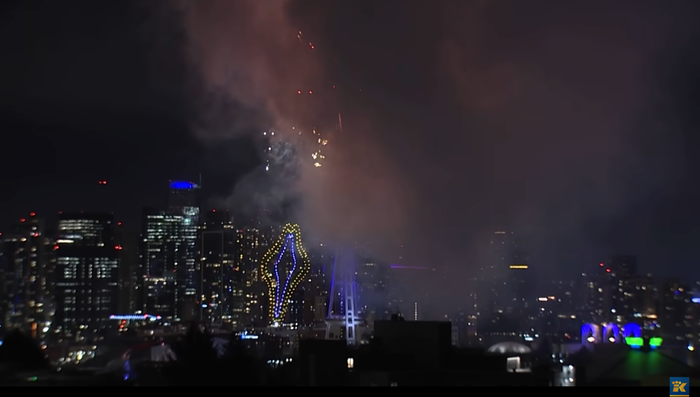
Late Monday night, members of an activism collective issued gentrification "citations" to 23rd Avenue businesses and development projects in the Central District. Uncle Ike's and CommuniTea Kombucha were two of the businesses that had the flyers taped onto their windows. The flyer, shown after the jump, reads:
NOTICE
THIS IS A KARMIC INFRACTION
Violations:
• Being an unapologetic gentrifier.
• Unchecked white/class privilege.
• Destroying Black and Brown communities.
• Making mortgages/rent unaffordable.
• Exasperating income segregation.
• Stealing Black culture while displacing Black People.Fines will be collected along with reparations in the revolution.
In interviews, artists Yeni Lopez Sleidi and Emnet Getahun told The Stranger they decided to issue the karmic infractions after experiencing gentrification first-hand or hearing from distraught friends who were pushed out of their neighborhoods. Sleidi, who is visiting town from her home in Miami, Fla., runs wwwayward.com, which focuses on the intersections of race, sexuality, and politics, among other topics.
The collective's goal, said Sleidi, is to reignite the conversation about the ongoing gentrification of the Central District and the displacement of people of color across Seattle. "It's easy to say that gentrification exists, acknowledge it, and move on," said Getahun. "But it's alive and thriving for black folks and people of color."

Ian Eisenberg, owner of Uncle Ike's, a controversial topic in the neighborhood, said he was concerned that the activists were the same people who shouted anti-Semitic epithets at him during a protest last year. He said he was concerned about an article about Israel on Wwwayward's site. (Neither Wwwayward nor the activist collective is anti-Semitic, Sleidi said.)
Sleidi said that Uncle Ike's was targeted because people of color had centered the cannabis shop in the conversation about gentrification. The karmic citation project was meant to call out people contributing to gentrification in the neighborhood, and according to Sleidi, those gentrifiers include white people as well as people of color, particularly those in the tech industry, who have the means to afford to live in fancy apartment buildings that are causing neighborhood rents to skyrocket.

Although they are trying to reignite the conversation about gentrification, Sleidi made it clear that she believes the problem cannot exist as just a discussion. People of color are being targeted by "predatory" housing developers, she said, and the people living in new buildings are not taking the necessary direct actions to stop that cycle. The Stranger asked Sleidi and Getahun for specific actions or solutions that they believe can address the concerns they're raising, but did not receive specific answers. Any answers, the artists argue, must come from the people they see as gentrifiers.
The Central District has been the staging ground for a number of anti-gentrification protests over the years and Uncle Ike's is no stranger to protests, said Eisenberg.
He admitted that the artists' critique of his business as a gentrifier is somewhat accurate. But the cannabis shop is also a half mile from Capitol Hill, which is being rapidly developed, too, he said.
"I'm part of this community and I've been to the committee meetings," said Eisenberg. "Ninety percent of the people I've talked with in the community say they love Ike's and they're happy that we've made this corner safer."
Eisenberg said he is concerned about communities of color being pushed out of the neighborhood, but also believes new developments have benefitted the community. New businesses are replacing boarded up stores and making the neighborhood commercially desirable again, he said.
"I think there's a difference between gentrification and displacement," said Eisenberg. "If you just try to call it 'gentrification,' you're oversimplifying the problem."
For Sleidi and Getahun, arguments like Eisenberg's put the burden to "figuring out gentrification" onto communities of color — and that's not right. To find solutions, they said, "people need to not be defensive. They need to acknowledge that white supremacy was and is at a play."

Joyner of CommuniTea Kombucha, a white-owned company, was sympathetic to the activist's cause.
"Development in this particular corner is amazing," he said. "The impact on traditional businesses in this neighborhood is very clear. The process didn't start when we got here and it's not going to end now — it's a wide ranging process."
While Joyner is aware that gentrification is a major issue in the CD, Joyner said this is the first time his business has been pointed to as part of the problem. "I'm certainly in solidarity with the people concerned with what's happening," he said.
"The copy on the flyer is very aggressive — and we don't take that back," Sleidi said. "People who are [economically comfortable] are able to extensively and critically think about their privileges, but they usually choose not to disrupt the comfort that other people's misfortune has granted them. Living comfortably shouldn't be something only white people can do."
She continued: "Our project's intention was to disrupt that comfort and make them regularly confront the repercussions of their economic and racial privileges, rather than to exist in a state of blissful ignorance."




















